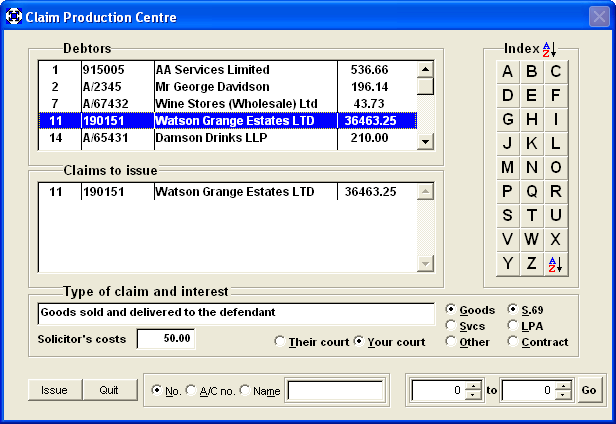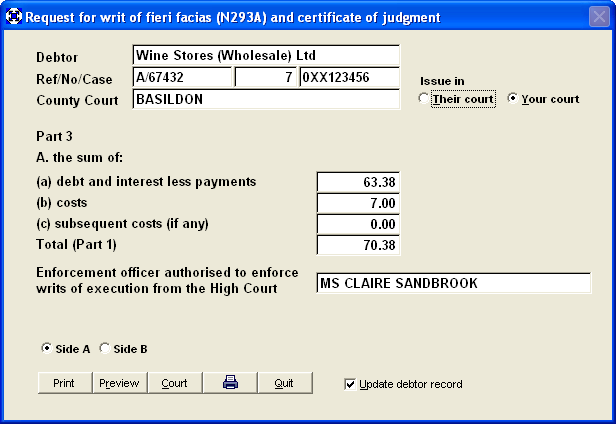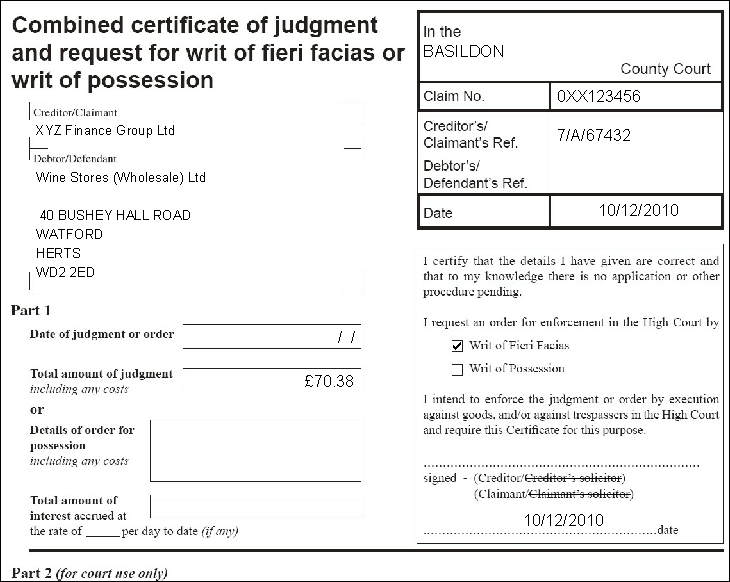FAQs - County Court
Q The debt I want to chase is disputed, should I issue a Claim anyway?
A No. Try to resolve the dispute first. A dispute is not a debt.
Q What additional penalties can I add for non-payment?
A Look at the Late Payment Act 1998 for fixed penalty charges.
Also look at Solicitors' charges that can be charged upon the issue of
a Claim or Entry of Judgment.
Q What types of interest can I charge when I issue a Claim?
A (1) S.69 interest (2) LPA interest (3) Contractual interest
 Q What should I do if I have issued a Claim and in the meantime the
debtor pays just the basic sum due?
A Enter the payment received in the DCM software and then enter
judgment in default for the costs and interest to judgment.
Q What is a Third Party Debt Order used for?
A Where you have obtained judgment, you can enforce the debt due
by getting a person who owes the debtor money to pay you.
Example: Barclays Bank PLC holds a £1000 deposit.
Complete Form N349 in the DCM software.
Q What is the fee to issue a Statutory Demand?
A None required.
Q I have a judgment debt for £1,200. How can I get a Sheriff to
collect the debt?
A Complete form N293A to transfer to the High Court for enforcement.
A Writ of FiFa will be issued for you.
Q What should I do if I have issued a Claim and in the meantime the
debtor pays just the basic sum due?
A Enter the payment received in the DCM software and then enter
judgment in default for the costs and interest to judgment.
Q What is a Third Party Debt Order used for?
A Where you have obtained judgment, you can enforce the debt due
by getting a person who owes the debtor money to pay you.
Example: Barclays Bank PLC holds a £1000 deposit.
Complete Form N349 in the DCM software.
Q What is the fee to issue a Statutory Demand?
A None required.
Q I have a judgment debt for £1,200. How can I get a Sheriff to
collect the debt?
A Complete form N293A to transfer to the High Court for enforcement.
A Writ of FiFa will be issued for you.

 Q How quickly can I issue a judgment in default?
A Normally 14 days after postal date of service.
However, if the defendant has submitted an Acknowledgement (on form N9A)
and no defence has been filed, you will have to wait 28 days.
Q I know that the judgment debtor has a full time job. How can I
use this information?
A Issue an Attachment of Earnings Order on Form N337.
Q Where a case is defended, how does the Court deal with that?
A The case will be handled under one of three 'tracks' according
to the value of the debt.
(1) Small Claims (2) Fast Track (3) Multi-track.
See Civil Procedure Rules parts 27, 28 and 29.
Q How quickly can I issue a judgment in default?
A Normally 14 days after postal date of service.
However, if the defendant has submitted an Acknowledgement (on form N9A)
and no defence has been filed, you will have to wait 28 days.
Q I know that the judgment debtor has a full time job. How can I
use this information?
A Issue an Attachment of Earnings Order on Form N337.
Q Where a case is defended, how does the Court deal with that?
A The case will be handled under one of three 'tracks' according
to the value of the debt.
(1) Small Claims (2) Fast Track (3) Multi-track.
See Civil Procedure Rules parts 27, 28 and 29.
Q What should I do if I have issued a Claim and in the meantime the debtor pays just the basic sum due? A Enter the payment received in the DCM software and then enter judgment in default for the costs and interest to judgment. Q What is a Third Party Debt Order used for? A Where you have obtained judgment, you can enforce the debt due by getting a person who owes the debtor money to pay you. Example: Barclays Bank PLC holds a £1000 deposit. Complete Form N349 in the DCM software. Q What is the fee to issue a Statutory Demand? A None required. Q I have a judgment debt for £1,200. How can I get a Sheriff to collect the debt? A Complete form N293A to transfer to the High Court for enforcement. A Writ of FiFa will be issued for you.

Q How quickly can I issue a judgment in default? A Normally 14 days after postal date of service. However, if the defendant has submitted an Acknowledgement (on form N9A) and no defence has been filed, you will have to wait 28 days. Q I know that the judgment debtor has a full time job. How can I use this information? A Issue an Attachment of Earnings Order on Form N337. Q Where a case is defended, how does the Court deal with that? A The case will be handled under one of three 'tracks' according to the value of the debt. (1) Small Claims (2) Fast Track (3) Multi-track. See Civil Procedure Rules parts 27, 28 and 29.


